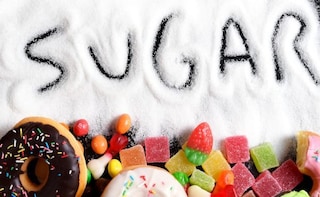Talk about sweeteners and crystal-like refined sugar comes to mind. But another variety of sweetener – Jaggery or popularly known as Gur in India is what our parents and grandparents would associate with. Sugar and jaggery are the two most commonly used sweeteners across the country. Although, both are obtained from the same sources, they have huge differences in terms of their properties and benefits. Both of them are produced by using sugarcane juice, but are treated and processed differently. They have different flavours and textures but can be substituted for each other in desserts and drinks. Given this, there is always a sugar versus jaggery war going on that often tends to confuse us. Let’s explore the differences between sugar and jaggery to understand which one is healthier and better for you.
Sugar Versus Jaggery: What’s the Difference?
- Sugar and jaggery are processed differently, hence they have their own distinct colours and textures. Sugar is typically in the form of white, translucent crystals while jaggery can range from golden brown and dark brown in colour, depending on the extent to which it is cooked.
- The texture of sugar is hard, crystallized and solid, while jaggery is semi-solid, softer and amorphous in nature.
- Both of them are made from sugarcane juice but are processed differently. After the initial boiling, in case of sugar, the syrup is treated with charcoal to absorb unwanted particles and to give it a clear and transparent look. Once the solution is condensed and crystalized, it results in sugar. While on the other hand, there is no treatment for jaggery except that the sugarcane syrup is boiled for several hours to produce a thick paste which is then placed in a mould to get a firm shape.
- Since sugar goes to a rigorous industrial process while being prepared it loses all its nutritional value along the way and what you get in the end is plain sucrose. On the other hand, jaggery manages to retain traces of iron, fiber and various mineral salts.
Sugar Versus Jaggery: Which One is Healthier?
For the latest food news, health tips and recipes, like us on Facebook or follow us on Twitter and YouTube.
Advertisement
